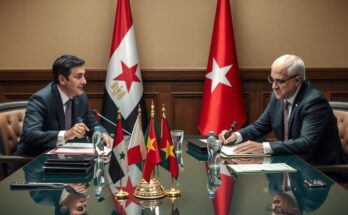In a recent statement, Lt-Gen Mohamed Hamdan Daglo of the Rapid Support Forces accused Egypt of launching airstrikes against his troops amid the ongoing conflict with the Sudan Armed Forces. This accusation comes as the humanitarian crisis in Sudan escalates, with over 18,000 deaths and 11 million displaced since April 2023. The Egyptian government has denied these claims, asserting its commitment to ending the conflict and providing humanitarian support.
The conflict in Sudan has deepened as Lt-Gen Mohamed Hamdan Daglo, the leader of the Rapid Support Forces (RSF), has publicly accused Egypt of conducting airstrikes against his troops amid ongoing fighting with the Sudan Armed Forces (SAF). Since April 2023, the RSF has been embroiled in this conflict, resulting in approximately 18,000 fatalities and the displacement of over 11 million individuals. While the RSF has often faced accusations from the SAF regarding support from the United Arab Emirates, this week, Lt-Gen Daglo asserted that Egypt has intensified its involvement in the conflict by training Sudanese soldiers and supplying them with drones, thereby enabling the SAF to gain an advantage in the battlefield. In a recorded address, Daglo expressed his frustration, stating that despite hopes for a resolution, Cairo’s role in supporting the Sudanese army had become increasingly apparent. The Egyptian Ministry of Foreign Affairs quickly countered these assertions, labeling them as unfounded and affirming Egypt’s commitment to humanitarian efforts aimed at resolving the conflict. They emphasized that Egypt is dedicated to the security and stability of Sudan and is actively pursuing diplomatic resolutions to the violence. Historically, Egypt has supported the Sudanese military, even having troops stationed in Sudan prior to the outbreak of hostilities. Following the onset of the war, Egypt sought to mediate a ceasefire, albeit without success. Recently, Egyptian President Abdel Fattah al-Sisi traveled to Eritrea to discuss the situation in Sudan and promote regional cooperation. Daglo’s accusations have provoked considerable debate, with various stakeholders weighing in on their implications. Sudan’s Finance Minister criticized the RSF leader’s remarks, interpreting them as an admission of defeat and an attempt to shift blame for the chaos wrought by the ongoing conflict. The humanitarian crisis in Sudan has reached alarming levels, as millions have been displaced, essential services have collapsed, and urgent medical supplies are scarce due to continued violence. International humanitarian organizations continue to face challenges in delivering aid amid the ongoing hostilities. Despite the ongoing attempts at mediation and humanitarian assistance, there is widespread skepticism regarding the effectiveness of international interventions to resolve this complex and deteriorating situation. Observers remain concerned that without significant diplomatic breakthroughs, Sudan’s condition may continue to worsen, risking further fragmentation of the nation.
The conflict in Sudan has escalated since April 2023, primarily involving the Rapid Support Forces (RSF) and the Sudan Armed Forces (SAF). This prolonged war has resulted in significant humanitarian crises, with millions displaced and widespread hunger and disease. The geopolitical landscape is further complicated by accusations among neighboring countries regarding military involvement and support, particularly with Egypt and the United Arab Emirates. The backdrop of historical ties between Egypt and Sudan plays a crucial role in shaping current accusations and diplomatic endeavors for resolution.
In conclusion, the ongoing conflict in Sudan is marked by rising tensions and accusations among involved parties. Lt-Gen Daglo’s claims against Egypt underscore the complexities and geopolitical intricacies influencing this crisis. While Egypt has refuted these allegations and expressed commitment to humanitarian assistance, the situation continues to deteriorate, with substantial humanitarian needs unmet. The forthcoming diplomatic efforts and international interventions remain critical in addressing the multifaceted challenges facing Sudan today.
Original Source: www.theeastafrican.co.ke



